J Korean Med Sci.
2015 Nov;30(11):1659-1666. 10.3346/jkms.2015.30.11.1659.
Gender Differences in Depressive Symptom Profile: Results from Nationwide General Population Surveys in Korea
- Affiliations
-
- 1Department of Psychiatry, College of Medicine, Inha University, Incheon, Korea.
- 2Department of Psychiatry and Behavioral Science, College of Medicine, Seoul National University, Seoul, Korea.
- 3Department of Neuropsychiatry, Seoul National University Hospital, Seoul, Korea.
- 4Department of Psychiatry, Depression Center, Samsung Medical Center, Sungkyunkwan University School of Medicine, Seoul, Korea.
- 5Department of Psychiatry, Gachon Medical School, Gachon University of Medicine and Science, Incheon, Korea.
- 6Department of Psychiatry, Sanggye Paik Hospital, College of Medicine, Inje University, Seoul, Korea.
- 7Department of Psychiatry, College of Medicine, Kangwon National University, Chuncheon, Korea.
- 8Department of Neuropsychiatry, Seoul Metropolitan Boramae Medical Center, Seoul, Korea.
- 9Samsung Advanced Institute for Health Science & Technology (SAIHST), Seoul, Korea.
- 10Department of Psychiatry, School of Medicine, Kyungpook National University, Daegu, Korea. psyjang@knu.ac.kr
- KMID: 2351118
- DOI: http://doi.org/10.3346/jkms.2015.30.11.1659
Abstract
- This study investigated gender differences in symptom profiles of major depressive disorder (MDD) in the Korean general population. Data were pooled from the series of nationwide Korean Epidemiologic Catchment Area surveys conducted in 2001, 2006 and 2011, respectively. Of the 18,807 participants, 507 (397 women and 110 men) were diagnosed with MDD within the prior 12 months. In agreement with previous studies, women with MDD appeared to be more vulnerable to experiencing atypical depressive episodes defined as depression with two or more symptoms of fatigue, increased appetite and hypersomnia (P < 0.001). In terms of individual symptoms, female gender was significantly related with higher prevalence of fatigue (P = 0.008), hypersomnia (P = 0.001), noticeable psychomotor retardation (P = 0.029) and suicidal attempts (P = 0.016) with adjustment for birth cohort effect, partner status, and employment status. In the same analysis, men with MDD appeared more vulnerable to decreased libido than women (P = 0.009). This is the first report to demonstrate gender differences in symptomatology of MDD in the general Korean population, and the results are comparable to previous investigations from western societies. Assumingly, the intercultural similarity in female preponderance to atypical depression might reflect the common biological construct underlying the gender difference in mechanism of MDD. In clinical settings, gender differences of MDD should be carefully considered, because these features could be related with treatment response and drug side effects.
Keyword
MeSH Terms
-
Adult
Aged
Aged, 80 and over
Depression/*diagnosis/*epidemiology/psychology
Depressive Disorder, Major/*diagnosis/*epidemiology/psychology
Employment/psychology/statistics & numerical data
Fatigue/*epidemiology/psychology
Female
Health Surveys
Humans
Male
Middle Aged
Prevalence
Reproducibility of Results
Republic of Korea/epidemiology
Risk Assessment
Sensitivity and Specificity
Sex Distribution
Sex Factors
Spouses/psychology/statistics & numerical data
Symptom Assessment/*statistics & numerical data
Young Adult
Figure
Cited by 1 articles
-
Depression and Mortality in People with Type 2 Diabetes Mellitus, 2003 to 2013: A Nationwide Population-Based Cohort Study
Jong-Hyun Jeong, Yoo Hyun Um, Seung-Hyun Ko, Jong-Heon Park, Joong-Yeol Park, Kyungdo Han, Kyung-Soo Ko,
Diabetes Metab J. 2017;41(4):296-302. doi: 10.4093/dmj.2017.41.4.296.
Reference
-
1. Kessler RC. Epidemiology of women and depression. J Affect Disord. 2003; 74:5–13.2. Nolen-Hoeksema S, Parker LE, Larson J. Ruminative coping with depressed mood following loss. J Pers Soc Psychol. 1994; 67:92–104.3. Hildebrandt MG, Stage KB, Kragh-Soerensen P. Gender and depression: a study of severity and symptomatology of depressive disorders (ICD-10) in general practice. Acta Psychiatr Scand. 2003; 107:197–202.4. Angst J, Gamma A, Benazzi F, Silverstein B, Ajdacic-Gross V, Eich D, Rössler W. Atypical depressive syndromes in varying definitions. Eur Arch Psychiatry Clin Neurosci. 2006; 256:44–54.5. Smith DJ, Kyle S, Forty L, Cooper C, Walters J, Russell E, Caesar S, Farmer A, McGuffin P, Jones I, et al. Differences in depressive symptom profile between males and females. J Affect Disord. 2008; 108:279–284.6. American Psychiatric Association. Diagnostic and statistical manual of mental disorders. 4th ed. Washington, DC: American Psychiatric Association;1994.7. American Psychiatric Association. Diagnostic and statistical manual of mental disorders. 5th ed. Washington, DC: American Psychiatric Association;2013.8. Marcus SM, Young EA, Kerber KB, Kornstein S, Farabaugh AH, Mitchell J, Wisniewski SR, Balasubramani GK, Trivedi MH, Rush AJ. Gender differences in depression: findings from the STAR*D study. J Affect Disord. 2005; 87:141–150.9. Chen CN, Wong J, Lee N, Chan-Ho MW, Lau JT, Fung M. The Shatin community mental health survey in Hong Kong. II. Major findings. Arch Gen Psychiatry. 1993; 50:125–133.10. Chiu E. Epidemiology of depression in the Asia Pacific region. Australas Psychiatry. 2004; 12:S4–S10.11. Cho MJ, Kim JK, Jeon HJ, Suh T, Chung IW, Hong JP, Bae JN, Lee DW, Park JI, Cho SJ, et al. Lifetime and 12-month prevalence of DSM-IV psychiatric disorders among Korean adults. J Nerv Ment Dis. 2007; 195:203–210.12. Chang SM, Hahm BJ, Lee JY, Shin MS, Jeon HJ, Hong JP, Lee HB, Lee DW, Cho MJ. Cross-national difference in the prevalence of depression caused by the diagnostic threshold. J Affect Disord. 2008; 106:159–167.13. Cho MJ, Chang SM, Lee YM, Bae A, Ahn JH, Son J, Hong JP, Bae JN, Lee DW, Cho SJ, et al. Prevalence of DSM-IV major mental disorders among Korean adults: A 2006 National Epidemiologic Survey (KECA-R). Asian J Psychiatr. 2010; 3:26–30.14. Cho MJ, Seong SJ, Park JE, Chung IW, Lee YM, Bae A, Ahn JH, Lee DW, Bae JN, Cho SJ, et al. Prevalence and correlates of DSM-IV mental disorders in South Korean adults: the Korean epidemiologic catchment area study 2011. Psychiatry Investig. 2015; 12:164–170.15. Cho MJ, Hahm BJ, Suh DW, Hong JP, Bae JN, Kim JK, Lee DW, Cho SJ. Development of a Korean version of the composite international diagnostic interview (K-CIDI). J Korean Neuropsychiatr Assoc. 2002; 41:123–137.16. World Health Organization. Procedures for the Development of New Language Versions of the WHO Composite International Diagnostic Interview (WHO-CIDI). Geneva, Switzerland: World Health Organization;1997.17. Kuehner C. Gender differences in unipolar depression: an update of epidemiological findings and possible explanations. Acta Psychiatr Scand. 2003; 108:163–174.18. Marcus SM, Kerber KB, Rush AJ, Wisniewski SR, Nierenberg A, Balasubramani GK, Ritz L, Kornstein S, Young EA, Trivedi MH. Sex differences in depression symptoms in treatment-seeking adults: confirmatory analyses from the Sequenced Treatment Alternatives to Relieve Depression study. Compr Psychiatry. 2008; 49:238–246.19. Romans SE, Tyas J, Cohen MM, Silverstone T. Gender differences in the symptoms of major depressive disorder. J Nerv Ment Dis. 2007; 195:905–911.20. Rolls BJ, Fedoroff IC, Guthrie JF. Gender differences in eating behavior and body weight regulation. Health Psychol. 1991; 10:133–142.21. Zellner DA, Loaiza S, Gonzalez Z, Pita J, Morales J, Pecora D, Wolf A. Food selection changes under stress. Physiol Behav. 2006; 87:789–793.22. Sobin C, Sackeim HA. Psychomotor symptoms of depression. Am J Psychiatry. 1997; 154:4–17.23. Khan AA, Gardner CO, Prescott CA, Kendler KS. Gender differences in the symptoms of major depression in opposite-sex dizygotic twin pairs. Am J Psychiatry. 2002; 159:1427–1429.24. Winkler D, Pjrek E, Heiden A, Wiesegger G, Klein N, Konstantinidis A, Kasper S. Gender differences in the psychopathology of depressed inpatients. Eur Arch Psychiatry Clin Neurosci. 2004; 254:209–214.25. Baldwin JD, Baldwin JI. Gender differences in sexual interest. Arch Sex Behav. 1997; 26:181–210.26. Antonijevic IA. Depressive disorders -- is it time to endorse different pathophysiologies? Psychoneuroendocrinology. 2006; 31:1–15.27. Lyoo IK, Yoon S, Kim TS, Hwang J, Kim JE, Won W, Bae S, Renshaw PF. A randomized, double-blind placebo-controlled trial of oral creatine monohydrate augmentation for enhanced response to a selective serotonin reuptake inhibitor in women with major depressive disorder. Am J Psychiatry. 2012; 169:937–945.28. Allen PJ, D'Anci KE, Kanarek RB, Renshaw PF. Chronic creatine supplementation alters depression-like behavior in rodents in a sex-dependent manner. Neuropsychopharmacology. 2010; 35:534–546.29. Eaton WW, Anthony JC, Tepper S, Dryman A. Psychopathology and attrition in the epidemiologic catchment area surveys. Am J Epidemiol. 1992; 135:1051–1059.30. de Graaf R, Bijl RV, Smit F, Ravelli A, Vollebergh WA. Psychiatric and sociodemographic predictors of attrition in a longitudinal study: The Netherlands Mental Health Survey and Incidence Study (NEMESIS). Am J Epidemiol. 2000; 152:1039–1047.
- Full Text Links
- Actions
-
Cited
- CITED
-
- Close
- Share
- Similar articles
-
- Individual and Socioeconomic Contextual Effects on Depressive Symptom in Korea: Multilevel Analysis of Cross-sectional Nationwide Survey
- Differences in Depressive Symptom Profile by Age Group in Koreans With Major Depressive Disorder: Results From Nationwide General Population Surveys
- Role of Gender in Improvement of Depressive Symptoms Among Patients Undergoing Cervical Spine Procedures
- The Group Differences with or without Depressive Symptom-Related Difficulty
- The role of supervisor support in the association between night work and depressive symptoms: a gender-stratified analysis of 22,422 full-time wage workers in Korea



